
Dhaka, formerly known as Dacca, is the capital and largest city of Bangladesh. It is the ninth-largest and seventh-most densely populated city in the world. Dhaka is a megacity, and has a population of 10.2 million residents as of 2022, and a population of over 22.4 million residents in Dhaka Metropolitan Area. It is widely considered to be the most densely populated built-up urban area in the world. Dhaka is the most important cultural, economic, and scientific hub of Eastern South Asia, as well as a major Muslim-majority city. Dhaka ranks third in South Asia and 39th in the world in terms of GDP. Lying on the Ganges Delta, it is bounded by the Buriganga, Turag, Dhaleshwari and Shitalakshya rivers. Dhaka is also the largest Bengali-speaking city in the world.

The economy of Bangladesh is a major developing market economy. As the second-largest economy in South Asia, Bangladesh's economy is the 33rd largest in the world in nominal terms, and 25th largest by purchasing power parity. Bangladesh is seen by various financial institutions as one of the Next Eleven. It has been transitioning from being a frontier market into an emerging market. Bangladesh is a member of the South Asian Free Trade Area and the World Trade Organization. In fiscal year 2021–2022, Bangladesh registered a GDP growth rate of 7.2% after the global pandemic. Bangladesh is one of the fastest growing economies in the world.
Bangladesh Export Import Company Limited, commonly known by its trade name BEXIMCO, is a Bangladeshi multinational conglomerate holding company, headquartered in Dhaka, Bangladesh. It was founded in the early 1970s.

Dhaka District is a district in central Bangladesh, and is the densest district in the nation. It is a part of the Dhaka Division. Dhaka, the capital of Bangladesh, and rests on the eastern banks of the Buriganga River which flows from the Turag to the southern part of the district. While Dhaka occupies only about a fifth of the area of Dhaka district, it is the economic, political and cultural centre of the district and the country. Dhaka District consists of Dhaka, Keraniganj, Nababganj, Dohar, Savar and Dhamrai upazila. Dhaka District is an administrative entity, and like many other cities, it does not cover the modern conurbation which is Greater Dhaka, which has spilled into neighbouring districts, nor does the conurbation cover the whole district, as there are rural areas within the district.
Transcom Limited is a Bangladeshi business conglomerate. The businesses under this group include beverage, pharmaceuticals, newspaper, radio channel, electronics, foods, etc. Transcom is the local agent or comprador of international brands. This group employs more than 10,000 people. Transcom Group is one of the oldest and biggest companies in Bangladesh. Their operation in Bangladesh initially started in 1985 as a tea plantation company.
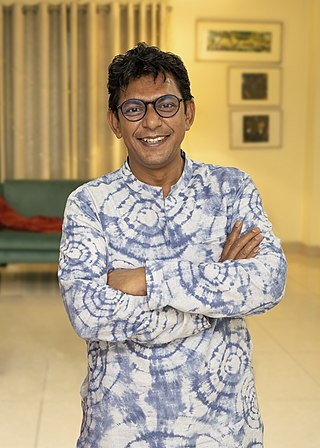
Suchinta Chowdhury Chanchal, is a Bangladeshi actor. He is notable for his performances in Rupkothar Golpo (2006), Monpura (2009), Television (2012), Aynabaji (2016), Debi (2018) and Hawa (2022). He has received three Bangladesh National Film Awards for Best Actor and three Meril Prothom Alo Awards for Best Actor.
Islami Bank Bangladesh PLC. (IBBPLC.) is an Islamic banking company based in Bangladesh. It became incorporated on 13 March 1983 as a public limited company under the Companies Act 1913 and started operation on 30 March, the same year. IBBPLC maintains its own ATM Booths with a country-wide shared ATM network. IBBPLC has been the largest private banking network in Bangladesh. When IBBPLC was established, it was the first bank in Southeast Asia to provide banking service based on Shariah. The bank has been listed with both Dhaka Stock Exchange Ltd. and Chittagong Stock Exchange Ltd.
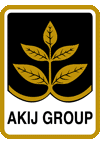
Akij Group is one of the largest Bangladeshi industrial conglomerates. The industries under this conglomerate include textiles, tobacco, food and beverage, cement, ceramics, printing and packaging, pharmaceuticals, consumer products etc. In 2009, Akij Group paid 390 million euros in tax, making it the biggest local tax-payer, contributing two per cent to the nation's entire budget. Akij also provides services in healthcare, information and communication technology. Its turnover in 2009 was 89 billion taka. In 2018, Akij sold their tobacco division to JTI for $1.47 billion. It was the biggest ever single foreign direct investment in Bangladesh.
Bashundhara Group is a Bangladeshi conglomerate and one of the largest manufacturing companies in Bangladesh. It was incorporated in 1987 as a real estate company under the name East West Property Development Ltd (EWPD). After its first project turned out to be successful, the company grew quickly. It presently owns more than 50 major concerns located throughout Bangladesh. The company's import-export turnover was $1.12 billion or BDT 111.38 billion in the 2022-23 fiscal year. In the 2018 fiscal year, the company's real estate holdings amounted to BDT 50,000 crores, or $4.6 billion.
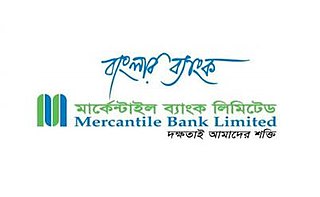
Mercantile Bank PLC is a commercial bank headquartered in Dhaka, Bangladesh.
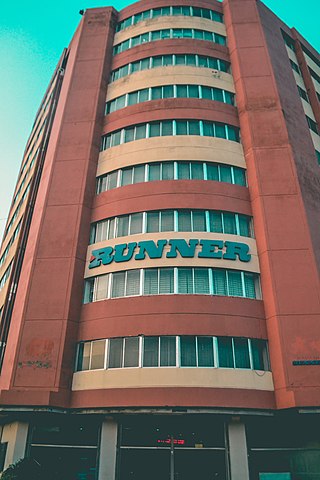
Runner Automobiles Ltd. (RAL) is a motorcycle and three-wheeler manufacturer based in Bangladesh. The company produces a range of motorcycles varying in size from 80 to 150 CC, and has become a major player in the sub 100 CC motorcycle segment in the country. In addition to motorcycles, Runner also produces three-wheeler auto-rickshaws in its Blaluka factory. The increase in disposable income among the general population and a rapidly growing middle class has contributed to the rise in demand for two-wheelers in Bangladesh. Runner offers 12 different models of motorcycles and scooters, with capacities ranging from 80 CC to 150 CC.

Walton is a conglomerate based in Gazipur, Bangladesh. It was founded in 1977 by S.M Nazrul Islam and operates in consumer electronics, home appliance, mobile phone, automobiles, and retail. The group's flagship company is Walton Hi-Tech Industries PLC..

Otobi is a Bangladesh-based furniture manufacturer and retailer. The company was established in 1975 by Nitun Kundu. Its Managing Director is Animesh Kundu who is the son of Nitun Kundu. Otobi manufactures both Home and Office furniture. Otobi sells its product locally in Bangladesh and exports to India too in an small volume.

Salman Fazlur Rahman is a Bangladeshi businessman, and a member of the Jatiya Sangsad. He is the Private Industry and Investment Adviser to Bangladesh Prime Minister Sheikh Hasina in the rank of a cabinet minister. Earlier, he served as the private sector development affairs adviser to her. He was ranked 1685th on the list of billionaires in the world published by Beijing-based Hurun Gobal in 2017. He is the vice chairman of BEXIMCO Group, one of the largest conglomerates in Bangladesh. He was the president of several trade bodies including Association of Television Channel Owners (ATCO).
The electronics industry in Bangladesh is one of the fastest-growing industries in the country with great potential. Popular Bangladeshi electronics brands include Walton Electronics, Singer Bangladesh, Jamuna Electronics, Vision Electronics. Local companies such as Fair Group, Butterfly Group, Electra, Rangs Group, Electro Mart, and Transcom Group manufacture and assembles Electronics Home Appliances in collaboration with foreign brands such as Samsung, Whirlpool, LG, Sony, Gree, Konka, and Sharp.
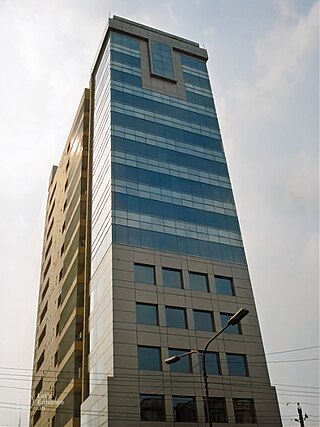
PRAN-RFL Group is a Bangladeshi conglomerate, founded in 1981 by Amjad Khan Chowdhury. The company is known for its diversified business portfolio, including food and beverage, plastic products, and agricultural machinery. It is one of the largest conglomerates in Bangladesh, with a presence in more than 145 countries. Pran-RFL Group is headquartered in Dhaka, Bangladesh, and employs over 140,000 people worldwide. The group operates under several subsidiaries, including Pran Foods, RFL Plastics, Pran-RFL Healthcare, and many others.

Bangladesh Pratidin, literally meaning Bangladesh Everyday, is a Bengali-language independent daily newspaper in Bangladesh. It was founded on 15 March 2010. Bangladesh Pratidin tops the list of highest circulated dailies in the country out of 345 newspapers published from Dhaka and elsewhere, the information minister told parliament 10 March 2014. Naem Nizam is the editor of Bangladesh Pratidin. Bangladesh Pratidin is a subsidiary of East West Media Group (EWMG), which is owned by Bashundhara Group. On behalf of EWMG, the publisher of the newspaper is Moynal Hossain Chowdhury.

Fakirerpool Young Men's Club is a Bangladeshi professional football club from Motijheel area of Dhaka, Bangladesh. It is currently competes in the Bangladesh Championship League the second-tier of Bangladeshi football.

Chorki is a Bangladeshi subscription-based over-the-top media service and original programming production company, owned by Transcom Group via Prothom Alo subsidiary of Mediastar Limited, and was launched on 12 July 2021. The service shows original content and content from other providers, including television series, films, and documentaries. The service is available in an ad-free version with limited content, while the premium tier includes a larger content library including original shows and films.

Kallol Group of Companies is a Bangladeshi diversified conglomerate based in Dhaka. Ghulam Mostafa is the managing director of Kallol Group. Kallol Group is a major importer of wristwatches in Bangladesh through its subsidiary Time Zone. It was the first importer of tissue in Bangladesh.


















